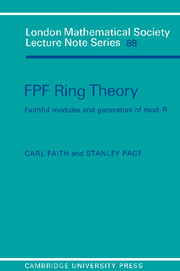Book contents
- Frontmatter
- Contents
- Preface
- Dedication and Acknowledgement
- Introduction
- Chapter 1 The Basics
- Chapter 2 Noncommutative Semiperfect and Semiprime
- Chapter 3 Nonsingular FPF rings
- Chapter 4 Goldie Prime FPF Rings with RRM and the Structure of Noetherian Prime FPF Rings
- Chapter 5 Self-Injective FPF Rings, Thin Rings and FPF Group Rings
- Summary of the Structure of FPF Rings
- Open Questions
- Bibliography
- Abbreviations and Symbols
- Index
Chapter 4 - Goldie Prime FPF Rings with RRM and the Structure of Noetherian Prime FPF Rings
Published online by Cambridge University Press: 05 April 2013
- Frontmatter
- Contents
- Preface
- Dedication and Acknowledgement
- Introduction
- Chapter 1 The Basics
- Chapter 2 Noncommutative Semiperfect and Semiprime
- Chapter 3 Nonsingular FPF rings
- Chapter 4 Goldie Prime FPF Rings with RRM and the Structure of Noetherian Prime FPF Rings
- Chapter 5 Self-Injective FPF Rings, Thin Rings and FPF Group Rings
- Summary of the Structure of FPF Rings
- Open Questions
- Bibliography
- Abbreviations and Symbols
- Index
Summary
In this chapter bounded Dedekind rings are characterized as the FPF rings among Noetherian prime rings (Theorems 4.6 and 4.15), employing the results of Chapter 3 on prime FPF rings, and the Asano-Michler theorem presently stated. As a corollary, we obtain that every Noetherian FPF prime ring is CFPF (Theorem 4.10), so every such ring is fully bounded and fully Goldie (in the sense that every factor ring has the stated property).
A prime Goldie ring R is right FPF iff R is right bounded and every nonzero finitely generated right ideal generates mod-R (4.7). In a right bounded Goldie prime ring, this happens whenever for any finitely generated right ideal J ≠ 0 the ideal RJ generates mod-R (4.12), in particular if every nonzero ideal generates mod-R. Thus, a Noetherian prime ring R is FPF iff it is bounded and every ideal ≠ 0 is a generator on both sides (Theorem 4.15).
Other theorems in this chapter aim at a classification of prime FPF rings which are not assumed to be Noetherian, that is, which may not be Dedekind. However, a right bounded right Goldie prime ring R with the right restricted minimum condition (RRM) is right Noetherian (Lemma 4.19A), hence any prime FPF ring R with RRM is right Noetherian and right hereditary. Such a ring is conjecturally a Dedekind prime ring. For rings with left restricted minimum condition, this conjecture is verified by Theorem 4.20.
- Type
- Chapter
- Information
- FPF Ring TheoryFaithful Modules and Generators of Mod-R, pp. 95 - 113Publisher: Cambridge University PressPrint publication year: 1984



